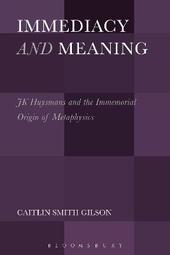
|
Immediacy and Meaning: J. K. Huysmans and the Immemorial Origin of Metaphysics
Hardback
Main Details
| Title |
Immediacy and Meaning: J. K. Huysmans and the Immemorial Origin of Metaphysics
|
| Authors and Contributors |
By (author) Dr. Caitlin Smith Gilson
|
| Physical Properties |
| Format:Hardback | | Pages:328 | | Dimensions(mm): Height 229,Width 152 |
|
| Category/Genre | Philosophy - metaphysics and ontology |
|---|
| ISBN/Barcode |
9781501329111
|
| Classifications | Dewey:110 |
|---|
| Audience | | Tertiary Education (US: College) | |
|---|
| Illustrations |
1 b/w illustration
|
|
Publishing Details |
| Publisher |
Bloomsbury Publishing Plc
|
| Imprint |
Bloomsbury Academic USA
|
| Publication Date |
9 February 2017 |
| Publication Country |
United States
|
Description
Immediacy and Meaning seeks to approach the odd uneasiness at root in all metaphysical meaning; that the human knower attempts to mediate what cannot be mediated; that there is a pre-cognitive immemorial immediacy to Being that renders its participants irreducible, incommunicable and personal. The dilemma of metaphysics rests on the relationship between the spectator and the player, both as essential responses to the immediacy of Being. Immediacy and Meaning is an attempt to pause, but without retreat, to be a spectator within the game, to gain access into this immediate Presence, for a moment only perhaps, before the signatory failure into metaphysical language returns us to the mediated. J. K. Huysman's semi-autobiographical tetralogy anchors this book as a meditation, neither purely poetic nor only philosophical; it claims a unique territory when attempting to speak what cannot be spoken. The unnerving merits of nominalism, the difficulties of an honest appraisal of efficacious prayer, the mad sanity of the muse, the relationship between the uncreated and the created, and an originary ethics of antagonism, each serves to clarify the formation of a new epistemology.
Author Biography
Caitlin Smith Gilson is Associate Professor of Philosophy at University of the Holy Cross, New Orleans, USA. She is the author of Metaphysical Presuppositions of Being-in-the-World (2010) and The Philosophical Question of Christ (2014), both published by Bloomsbury.
ReviewsThe title does not do justice to this book's rich, eclectic contents; it manages to contain at once an analysis of J. K. Huysmans's Durtal tetralogy, a philosophical inquiry into the nature of human knowledge and freedom, a theological exploration of prayer and suffering, and a florilegium of passages from various poets, mystics, and philosophers in and outside the Catholic tradition. * Review of Metaphysics * Gilson is without a doubt one of the most remarkable, creative and enticing voices writing today within the tradition of the Continental religious turn of an expressly Christian vision and vintage ... Gilson's unique polyphonic and dramatically literary voice further demands comparison with the beautifully wounded speech of Jean-Louis Chretien and before him, Max Picard ... A profound metaphysics of prayer which takes us upon a meditative pilgrimage to the Absolute. * Louvain Studies * Smith Gilson is an emerging Catholic intellectual working at the intersection of philosophy, theology, and literature. This book brings to our philosophical and theological attention the later work of Huysmans and uses it as a platform for insightful reflections on origin, time, and narrative, as well as deep engagement with both the classical and modern philosophical traditions. At its deepest, however, it is a reflection on experience and what exceeds it. * Cyril O'Regan, Huisking Professor of Theology, University of Notre Dame, USA * Incorporating an impressive array of works of poetry, prose, philosophy, and theology, this book is no mere work of scholarship. Rather, it is a unique and powerful philosophical meditation upon what it means to be human. It claims that to be human is to be responsive, and thus to bear the responsibility for our knowing, our freedom, and our person. Thus, Gilson proposes that we rethink the notion of the human knower as subject. We are responsive as knowers and agents because we are originally the other to the primal Being and Knower. Thus we are not, as philosophy commonly assumes, primarily the knowing subject, but rather we are a dative of manifestation and we are such because we are primarily datives of love. The work begins by explaining the distortion in our knowledge caused by our necessarily mediated knowing and speaking, and promises the way for us to find our meaning in the unmediated by way of a profound interpretation of memory. Immediacy and Meaning thus claims to retrieve 'the specific anthropology of our own memorial-as-immemorial Other.' The theme of this and her previous three books interpenetrate each other and recur in various and ever interesting degrees of dialogue: God and man, time and eternity, faith and reason, universal and particular, nature and grace, immediacy and meaning, and Truth and Being. To quote another Gilson: 'To introduce others to some important aspects of metaphysical being is no common gift.' * Dr. Herbert E. Hartmann, Clinical Assistant Professor of Philosophy and Director of First-Year Experience, The Catholic University of America, USA *
|